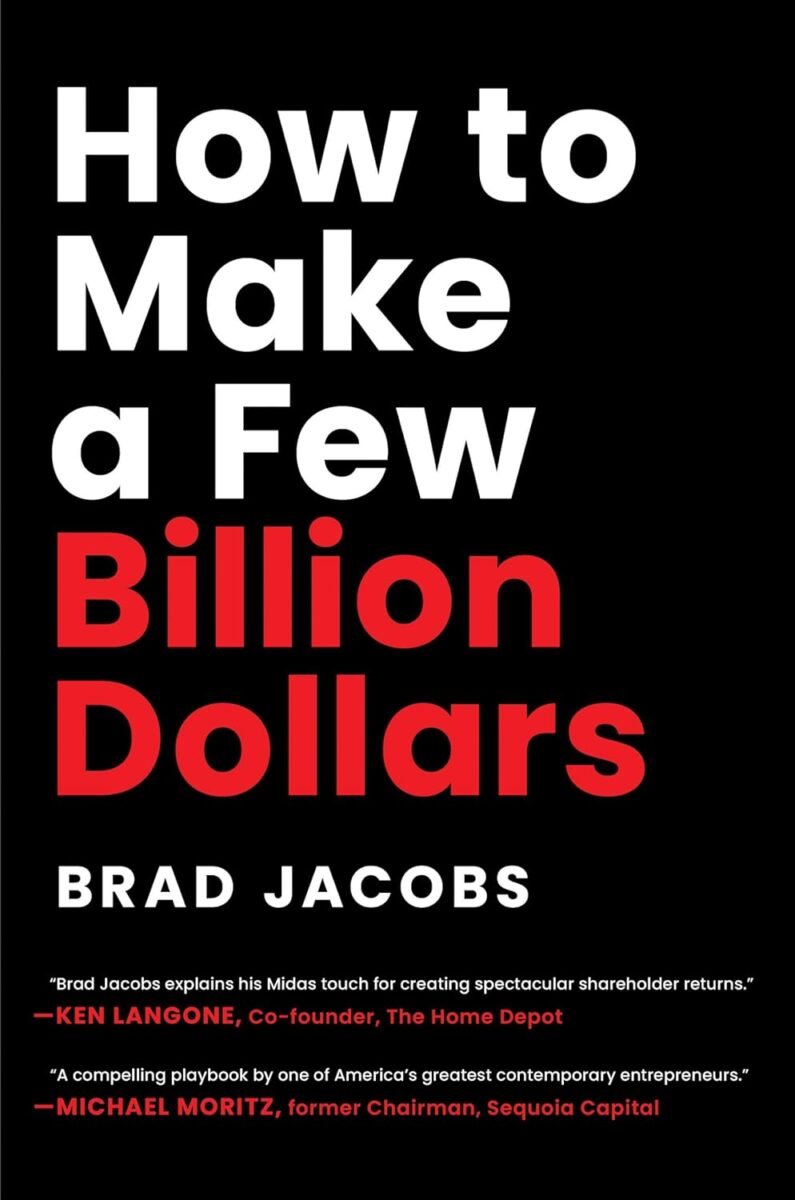Brad Jacobs and the art of making money
There is an old saying that if you’re the smartest person in the room, you’re in the wrong room. If there is a single exception to that saying, it would certainly be Brad Jacobs – he is clearly the smartest man in any room he is in.
“In corporate America, I’m what’s called a moneymaker,” said Jacobs in the introduction of his new book “How to Make a Few Billion Dollars,” which will be published on Jan. 15, 2024, by Greenleaf Book Group Press. “I’ve started five companies from scratch—seven if you include two spin-offs—and turned them all into billion-dollar or multibillion-dollar enterprises. My teams and I have completed approximately 500 acquisitions and opened more than 250 greenfield locations. In total, these ventures have created hundreds of thousands of jobs and raised about $30 billion in outside capital.”

Jacobs’ impact has helped make Fairfield County a center for global corporate prominence – among this locally-based ventures have been United Waste Systems, United Rentals, XPO and its spin-offs GXO Logistics and RXO; he is also a Greenwich resident. Jacobs holds the chairman of the board positions with XPO, GXO and RXO and is managing partner of his Jacobs Private Equity LLC.
In an exclusive interview with the Business Journal, Jacobs offered a preview of his book, which is already ranked as number one in Amazon’s Strategy & Competition and Consolidation & Merger book categories – even though its release is two months away.
Congratulations on your new book. I guess the first question is an obvious one: what inspired you to write a book?
I wanted to share with people the main reasons why the companies I’ve led have been so successful. When I put pen to paper, I realized it wasn’t only about business – it was for anyone who wants to do something big in their personal life or professional life. I also wanted to write down in one place the biggest things I’ve messed up over my last 44 years of being a CEO and what I’ve learned from those mess ups.

In your opinion, is business leadership something that you’re born with? Or is it something that you can learn in school or on the job?
I think it’s both. Some people are born leaders, and others are not attracted to taking charge of large groups of people. But someone who’s born with natural leadership skills will become a much more effective leader if they have mentors and work hard at sharpening their skills. In the opening section of the book I mentioned 23 heroes and mentors I’ve been fortunate to have and what I’ve learned from them.
One of the most intriguing segments of the book involves artificial intelligence, which you refer to as “the mothership of the future.” Can you explain what that means?
Artificial intelligence is emerging as the determining factor in whether businesses and entire industries will collapse or succeed. What’s clear is that AI’s impact will eventually exceed anything we can imagine.
Industries have been caught off guard by advanced advances in tech before, but AI will be much bigger. That’s why technology’s always been a central part of the business plans of the companies I’ve led.
Your book details the multiple deals that you transacted over the years. How do you address the stressful emotional challenges that arise in the mergers and acquisition process?
Successful executives, whether in M&A or not, learn to keep their head in a good place. Different techniques work for different people. Some people use meditation, others cognitive therapy, some people practice mindfulness. I dabble in all those. And I am constantly expanding my repertoire.
What has been most successful for you?
In the book, I have described thought experiments, which is the translation from the German of “gedankenexperiments,” which is what Einstein used in order to develop these theorems. At the very end of the book and in one of the appendices, I list about a dozen or so specific thought experiments that people can try out for themselves.
What do you attribute to building a successful corporate culture?
You build a winning culture first by only hiring extraordinary talent. People who are intelligent, hungry, kind hearted and who have integrity – and then pay them really well and tie their compensation to results. I listed in the appendix 45 questions that we use to interview people to screen for these qualities, just like the core competencies related to their job.
We don’t have pool tables or beer kegs at our headquarters in Greenwich – there’s a quiet intensity as people go about their work. But there’s also an emotional warmth. People admire and trust each other. And they enjoy spending time with each other, which is very important.
On the flip side of it, what are the warning signs that a corporate culture has become toxic?
Ineffective workplaces have cliques. Information doesn’t flow. People are afraid to speak up. There’s a boring or even negative vibe in the office. It’s almost impossible to achieve superior results with that type of culture.
One of the things that I’m most proud of when I was CEO of XPO is that the average employee satisfaction score at our Greenwich headquarters was consistently between 9 and 9.5 on a scale of 1 to 10. You can accomplish a lot of great things when you have an uplifting and nourishing office atmosphere like that.

One of the book’s chapters refers to “electric meetings.” For the benefit of people who haven’t seen the book yet, how do you define an electric meeting?
The short and sweet of it is that there are three ingredients that go into making group meetings electric: the right people, a crowd sourced agenda, and an atmosphere where everyone feels safe and is encouraged to respectfully disagree to present alternative perspectives.
Regarding people being encouraged to disagree – I’ve worked in companies where a difference of opinion was certainly not encouraged. Was I just unlucky or is that the norm in today’s workplace?
I can only speak from the companies I’ve run. Respectful disagreement has been highly encouraged because that dialectical thinking is what gets you to deep insights and actions. And it helps you solve problems. The enemy of problem-solving is rigid thinking and not daring to look at issues from multiple perspectives.
Now that you are a published author with one book down, are there going to be more books? And what else is on your agenda for 2024?
If I knew how much time went into writing a book, I’m not sure I would have written this book. I don’t think I’m going to have time next few years to write another book, because I plan to start another public company from scratch and grow it to many, many billions of dollars.
My initial investors in XPO made 30 times their money. I don’t know whether I’ll be able to replicate that again. My report card will be how much shareholder value we create, so stay tuned.